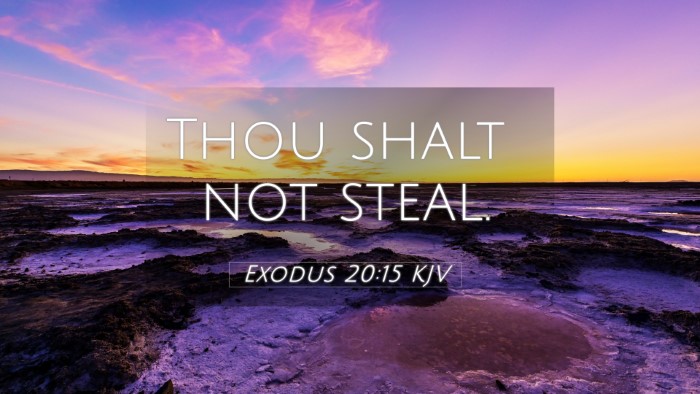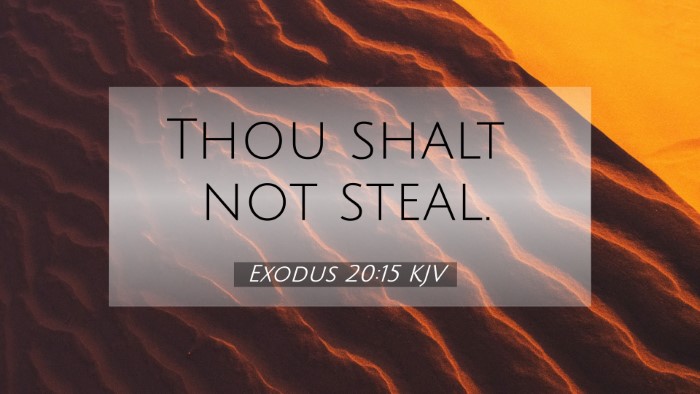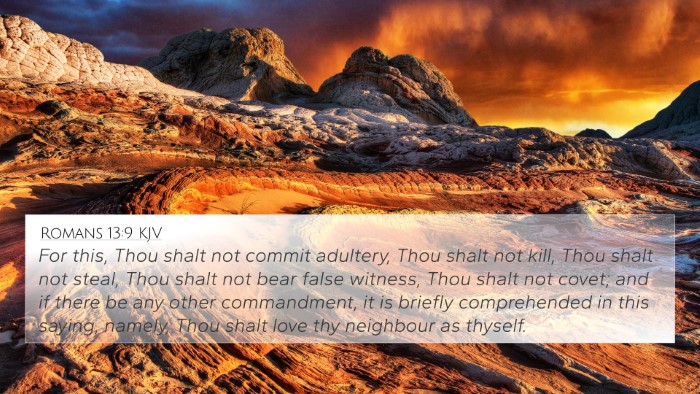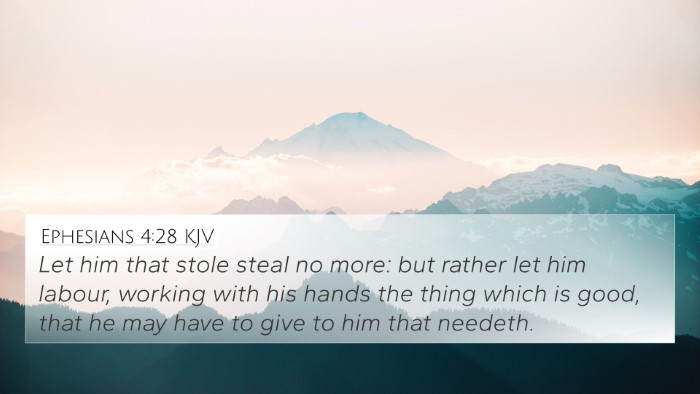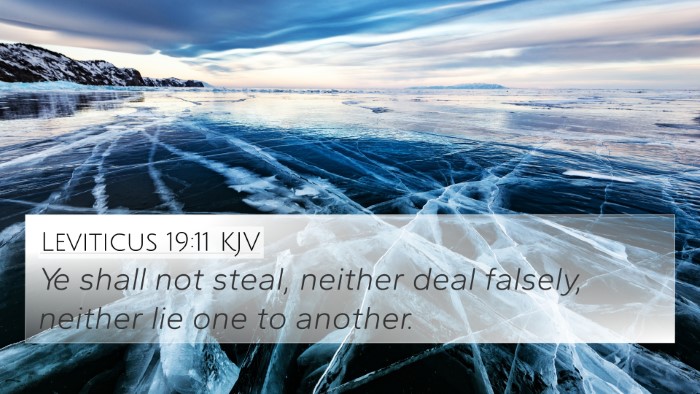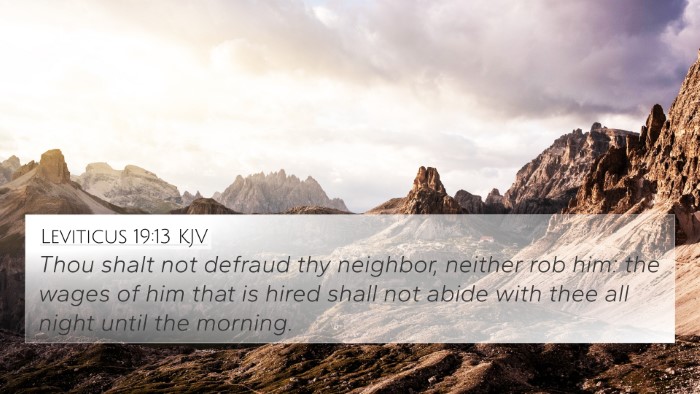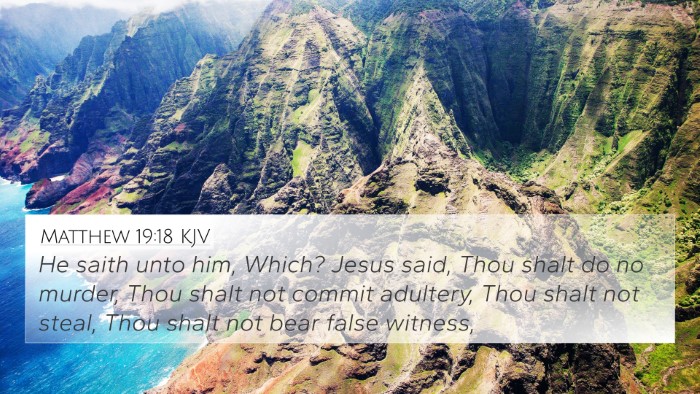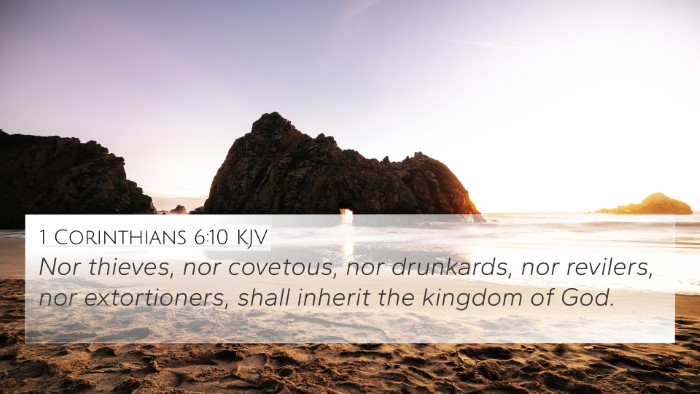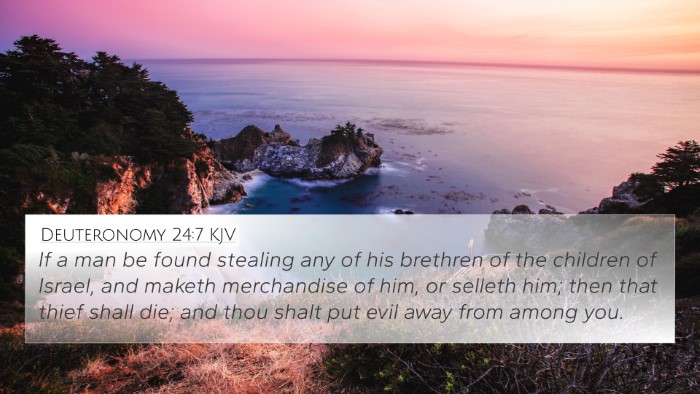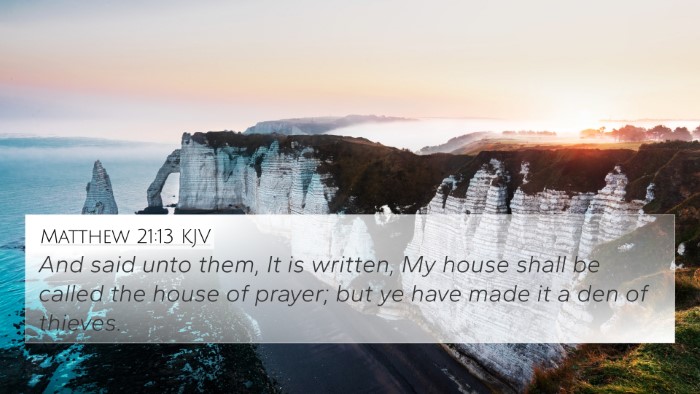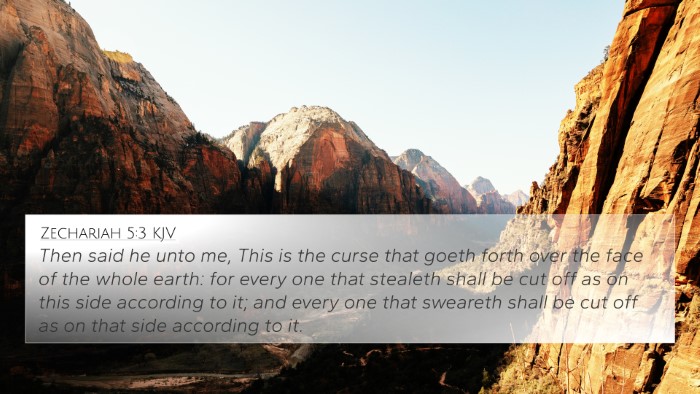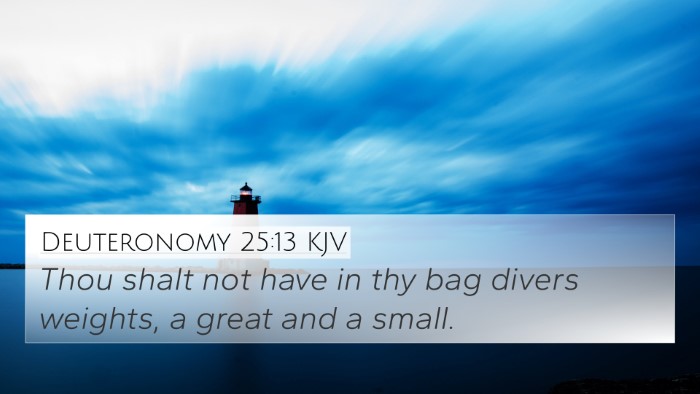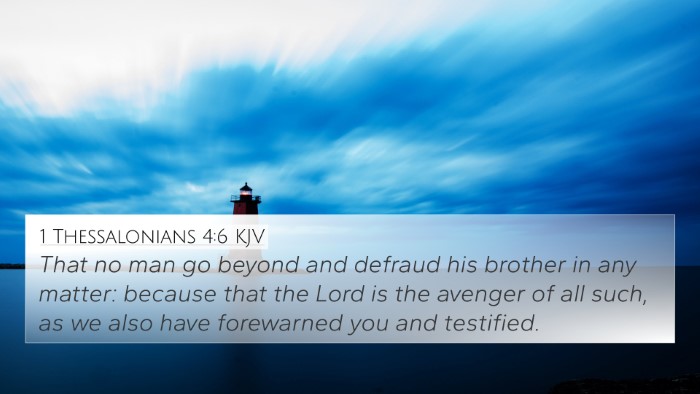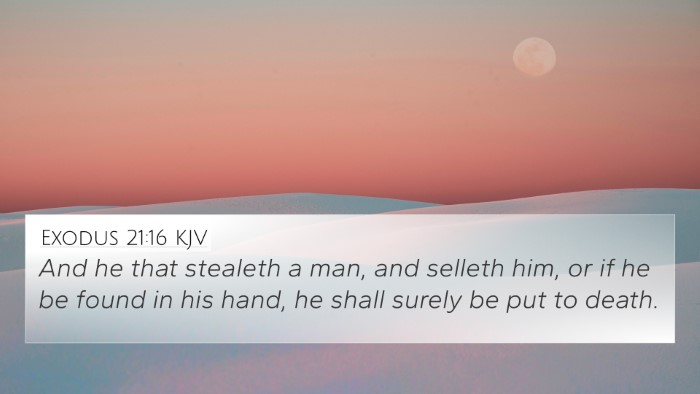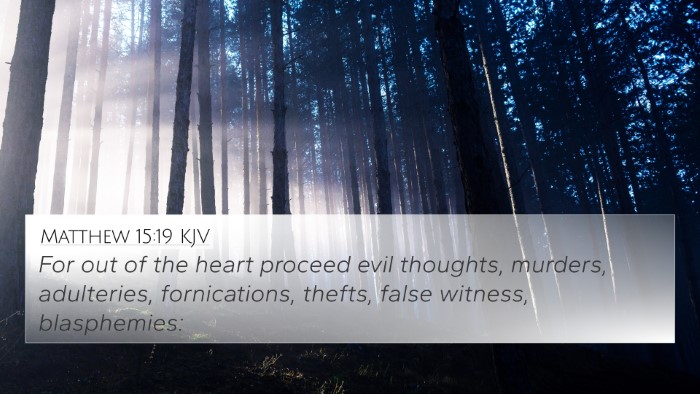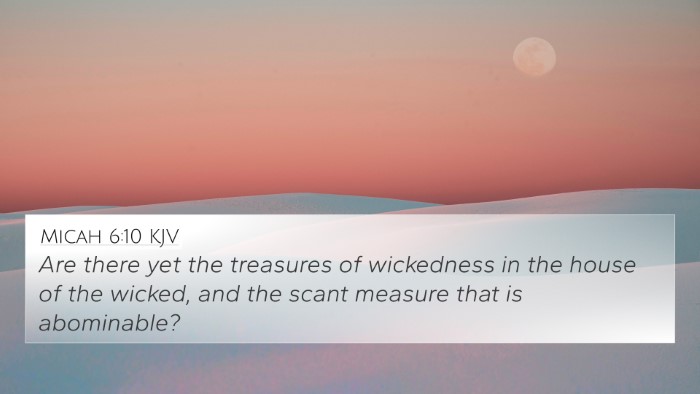Meaning and Interpretation of Exodus 20:15
Bible Verse: Exodus 20:15 - "You shall not steal."
Summary of the Verse
In Exodus 20:15, the commandment "You shall not steal" serves as a moral injunction against taking what does not belong to us. This fundamental principle highlights the respect for others' property and rights. It is essential in maintaining social order and justice, encapsulating the ethical standards expected of individuals in a community.
Insights from Public Domain Commentaries
Matthew Henry's Commentary
Matthew Henry emphasizes that stealing is not only the physical act of taking someone's belongings but also represents a broader concept of dishonesty and betrayal of trust. He elaborates on various forms of theft, including deceitfulness in trade and unjust gains. Henry reinforces that stealing undermines the social fabric by fostering distrust and encourages theft of any kind to be considered a sin against God.
Albert Barnes' Commentary
Albert Barnes notes that the prohibition against stealing is interwoven with the broader themes of respect for property and communal integrity. He cites that the commandment serves as a reflection of God's desire for harmony among His people and signifies the importance of honesty as a divine virtue. Barnes also makes connections between this commandment and the implications of wrongful acquisition of wealth in society.
Adam Clarke's Commentary
Adam Clarke delves deeper into the moral reasoning behind the commandment. He points out that theft not only harms the victim but ultimately harms the community and the thief themselves, as it reflects a lack of faith in God’s provisions. Clarke encourages readers to acknowledge the spiritual roots of this commandment, inviting them to consider the implications of their actions on both a personal and societal level.
Connections with Other Bible Verses
Understanding Exodus 20:15 can be enriched through cross-referencing various biblical texts that deal with similar themes of property rights, integrity, and justice. Below are some significant verse connections:
- Leviticus 19:11: "You shall not steal; you shall not deal falsely; you shall not lie to one another." - This verse reinforces the linkage between stealing and other forms of dishonesty.
- Proverbs 30:8-9: "Remove far from me falsehood and lying; give me neither poverty nor riches; feed me with the food that is needful for me." - This reflects the desire for honest gains rather than stealing or deceit.
- Ephesians 4:28: "Let the thief no longer steal, but rather let him labor, doing honest work with his own hands, so that he may have something to share with anyone in need." - Paul encourages hard work as an alternative to theft.
- Zecharaiah 5:3: "This is the curse that goes out over the face of the whole land; for everyone who steals shall be cleaned out according to what is on one side, and everyone who swears falsely shall be cleaned out according to what is on the other side." - This verse signifies the divine consequences for theft.
- 1 Thessalonians 4:6: "That no one transgress and wrong his brother in this matter, because the Lord is an avenger in all these things, as we told you beforehand and solemnly warned you." - This warning reinforces the moral injunction against stealing in a relational context.
- Romans 13:9: "For the commandments, 'You shall not commit adultery, you shall not murder, you shall not steal, you shall not covet,' and any other commandment, are summed up in this word: 'You shall love your neighbor as yourself.'" - This encapsulates the commandment within the larger law of love.
- John 10:10: "The thief comes only to steal and kill and destroy. I came that they may have life and have it abundantly." - This contrasts the purposes of God with the destructive nature of theft.
- Exodus 22:1: "If a man steals an ox, or a sheep, and kills it, or sells it, he shall repay five oxen for an ox, and four sheep for a sheep." - This illustrates the legal consequences of theft, emphasizing restitution.
- Matthew 19:18: "He said to him, 'Which ones?' And Jesus said, 'You shall not murder, You shall not commit adultery, You shall not steal, You shall not bear false witness.'" - Jesus reiterates the importance of these commandments in moral living.
Thematic Bible Verse Connections
In exploring the theme of theft, moral integrity, and property rights, the connections between the commandments showcase the biblical narrative’s emphasis on righteousness and justice. The inter-Biblical dialogue relating to Exodus 20:15 encourages further studies into how these principles play out in both the Old and New Testaments. For instance, Jesus’ teachings often reflected on the significance of honesty and heartfelt adherence to God’s commands.
Tools for Bible Cross-Referencing
To delve deeper into the scripture and uncover additional connections, various tools for Bible cross-referencing can be utilized:
- Bible Concordance: A useful tool that indexes words and phrases, providing related verses in context.
- Bible Cross-Reference Guides: These guides specially outline connections between different scriptures, aiding in comparative analysis.
- Cross-Reference Bible Study: Engaging in a methodical study that links themes, narratives, and commandments across the Bible.
- How to Use Bible Cross-References: Tips on navigating through scripture efficiently to find relational verses.
- Bible Cross-Reference System: Systems organized by themes, topics, or keywords that highlight connections.
- Bible Reference Resources: Access to comprehensive materials for deeper theological understanding.
User Intent and Searching for Related Verses
When seeking to understand a specific verse like Exodus 20:15, it’s essential to explore related inquiries such as:
- What verses are related to Exodus 20:15? This leads to a broader understanding of the thematic implications of theft.
- Find cross-references for Exodus 20:15 allows for deeper exploration of biblical mandates on honesty.
- How do Exodus 20:15 and Ephesians 4:28 connect? This explores the different teachings on personal conduct and ethics.
- Similarities between Exodus 20:15 and Leviticus 19:11 reveal the consistency in God's moral law.
- Bible verses that support Exodus 20:15 add layers to the understanding of the commandment's significance.
Conclusion
Exodus 20:15 stands as a clear and compelling command against theft, rooted in God's desire for justice, integrity, and respect among individuals. By examining various interpretations and related verses, one can appreciate the import of this commandment not just in a historical context but also in its relevance today. The interconnectedness of biblical teachings on this commandment illustrates a unified call to righteousness and honesty, essential in our ethical frameworks.

